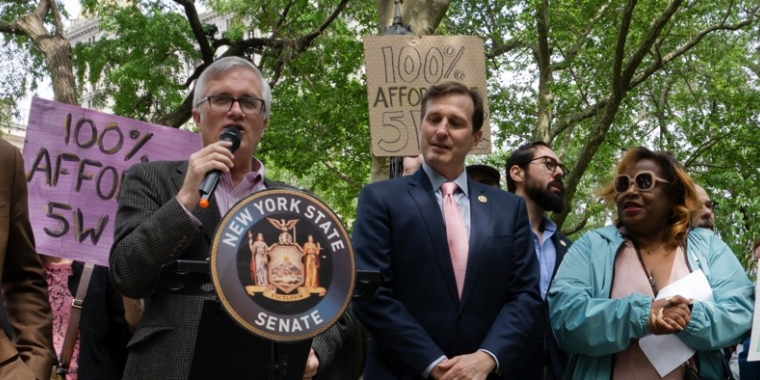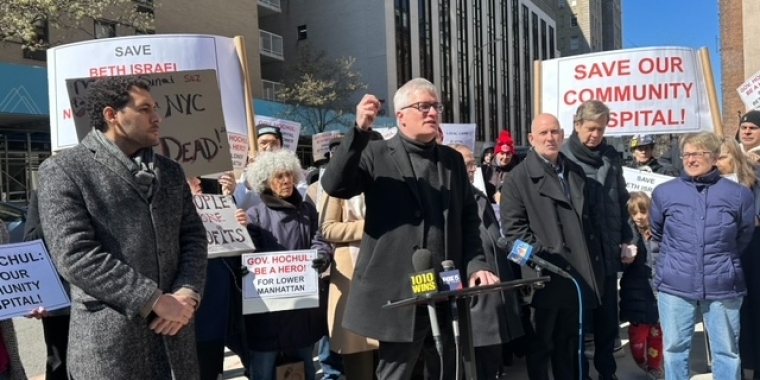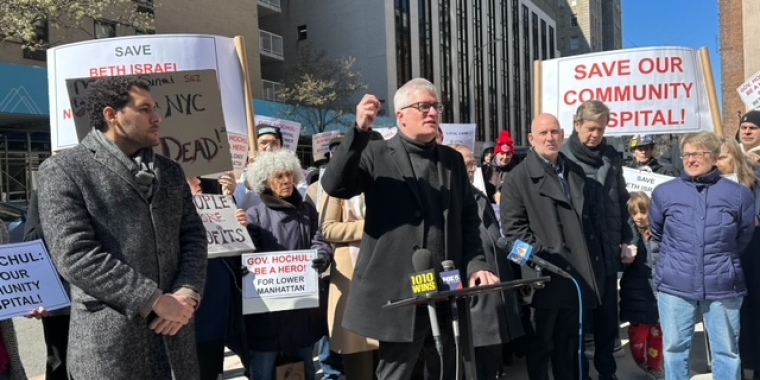Joint Statement From Senate Majority Leader Andrea Stewart-Cousins And Assembly Speaker Carl Heastie On Historic Affordable Housing Legislation
June 11, 2019
-
ISSUE:
- Housing
- rent laws
- Affordable Housing

“These reforms give New Yorkers the strongest tenant protections in history. For too long, power has been tilted in favor of landlords and these measures finally restore equity and extends protections to tenants across the state. These reforms will pass both legislative houses and we are hopeful that the Governor will sign them into law. It is the right thing to do.”
“None of these historic new tenant protections would be possible without the fact that New York finally has a united Democratic Legislature. Our appreciation also goes to the tenant advocacy groups and activists that fought so hard to make this possible.”
###
Cea Weaver, Campaign Director of the Upstate Downstate Housing Alliance, said, “The Senate and the Assembly have come together with a proposal to confront decades of injustices in New York State’s tenant protection system. Housing Justice for All is proud to stand with the State Legislature as it takes meaningful steps forward to end tenant harassment, displacement, destabilization, and rising rents. This bill is affirmation of the Statewide movement that we are building together, and we look forward to working with the Senate and the Assembly, in the years to come, until every renter, from Brooklyn to Buffalo, can live free from the fear of displacement”
Adriene Holder, Attorney-in-Charge of the Civil Practice at The Legal Aid Society said “The Legal Aid Society commends the New York State Senate and Assembly for reaching this deal to advance historic housing reforms across the State. This package of legislation will reverse decades of rampant landlord abuse and enact much-needed protections for hundreds of thousands of tenants in New York State. It is a new day for our clients and all low-income communities who have been disproportionately impacted by rent loopholes. We thank Senate Majority Leader Stewart-Cousins and Assembly Speaker Heastie for their leadership in moving the State forward and strengthening our communities.”
Rosemary Rivera, Co-Executive Director of Citizen Action of NY, said, “This past election ignited the fires of change as evidenced by today's tenant protection package. The Senate and Assembly have listened to the needs of tenants across the state and put forth bold legislation to end the housing crisis, showing how ordinary people, when organized, can beat back the billionaire real estate giants. We applaud the Senate and Assembly for taking a giant first step toward protecting tenants and affirming that housing a human right.”
Beth Finkel, New York State Director for AARP, said, “AARP advocated for stronger tenant protections and reforms to make New York’s rent laws work, and this agreement marks an historic day for affordable housing in New York City and other key neighborhoods in New York State. Strengthening our rent laws will preserve existing affordable housing and help keep New York City a great place to live for residents of all ages, and AARP applauds our legislators for stepping up for their constituents.”
“Legal Services NYC thanks the NY senate and assembly for decisively addressing the displacement crisis in our clients communities. The proposed bills will make an immeasurable difference to thousands of low income and working families who are struggling to survive in NYCs housing market.”
Benjamin Dulchin, Executive Director of the Association of Neighborhood and Housing Development, said, “For too long, weak regulations have led speculators to harass and displace tenants in communities across New York. Affordable housing developers know that stability benefits both tenants and landlords, and that housing quality and housing affordability can go hand in hand. We applaud the State Legislature for the proposed bill, which represents an enormous step forward for millions of tenants.”
###
BACKGROUND
· Extends the Rent Regulations Laws and Makes them Permanent:
o This extender makes the rent regulation system permanent, so they will not sunset at any time in the future without an act of the Legislature to repeal or terminate them.
o Rent Regulation laws have been scheduled to expire every four to eight years for decades.
· Repeals High Rent Vacancy Deregulation & High Income Deregulation:
o Repeals the provisions that allow removal of units from rent stabilization when the rent crosses a statutory high-rent threshold and the unit becomes vacant or the tenant’s income is $200,000 or higher in the preceding two years.
o Previous provisions led to the deregulation of more than 300,000 units since they were first passed in 1994.
· Reforms Owner Use Exception to Rent Regulation:
o Limits the use of the “owner use” provision to a single unit, requires that the owner or their immediate family use the unit as their primary residence, and protects long-term tenants from eviction under this exception by reducing the current length of tenancy required to be protected from eviction to 15 years.
· Keeps Stabilized Apartments Rented by Nonprofits in the Rent Stabilization System:
o Limits the temporary non-profit exception to rent stabilization by requiring units to remain rent-stabilized if they are provided to individuals who are or were homeless or are at risk of homelessness.
o Provides that individuals permanently or temporarily housed by nonprofits status as tenants while ensuring that units used for these purposes remain rent stabilized.
· Repeals the Vacancy Bonus & Longevity Bonus:
o Repeals the “vacancy bonus” provision that allows a property owner to raise rents as much as 20% each time a unit becomes vacant.
o It also repeals the “longevity bonus” provision that allows rents to be raised by additional amounts based on the duration of the previous tenancy.
o Prohibits local Rent Guidelines Boards from reinstating vacancy bonus on their own.
· Prohibits Rent Guidelines Board from Setting Class-Specific Renewal Increases:
o Prohibits Rent Guidelines Boards from setting additional increases based on the current rental cost of a unit or the amount of time since the owner was authorized to take additional rent increases, such as a vacancy bonus.
· Makes Preferential Rents the Base Rent for Lease Renewal Increases:
o Prohibits owners who have offered tenants a “preferential rent” below the legal regulated rent from raising the rent to the full legal rent upon renewal.
o Once the tenant vacates, the owner can charge any rent up to the full legal regulated rent, so long as the tenant did not vacate due to the owner’s failure to maintain the unit in habitable condition.
o Owners with rent-setting regulatory agreements with federal or state agencies will still be permitted to use preferential rents based on their particular agreements.
· Provides Relief from Large Rent Increases for Rent-Controlled Tenants:
o Sets Maximum Collectible Rent increases at the average of the five most recent Rent Guidelines Board annual rent increases for one-year renewals.
o This bill also prohibits fuel pass-along charges.
· Extends Rent Overcharge Four-Year Look-Back Period to Six Years:
o Extends the four-year look-back period to six or more years as reasonably necessary to determine a reliable base rent, extends the period for which an owner can be liable for rent overcharge claims from two to six years, and would no longer allow owners to avoid treble damages if they voluntarily return the amount of the rent overcharge prior to a decision being made by a court or Housing and Community Renewal (HCR).
o Allows tenants to assert their overcharge claims in court or at HCR and states that while an owner may discard records after six years, they do so at their own risk.
· Reforms Rent Increases for Major Capital Improvements (MCIs):
o Lowers the rent increase cap from 6% to 2% in New York City and from 15% to 2% in other counties.
o Provides the same protections of the 2% cap going forward on MCI rent increases attributable to MCIs that became effective within the prior 7 years.
o Lowers increases further by lengthening the MCI formula’s amortization period.
o Eliminates MCI increases after 30 years instead of allowing them to remain in effect permanently.
o Significantly tightens the rules governing what spending may qualify for MCI increases and tightens enforcement of those rules by requiring that 25% of MCIs be inspected and audited.
· Reforms Rent Increases for Individual Apartment Improvements (IAIs):
o Caps the amount of IAI spending at $15,000 over a 15-year period and allow owners to make up to 3 IAIs during that time.
o Makes IAI increases temporary for 30 years rather than permanent and requires owners to clear any hazardous violations in the apartment before collecting an increase.
· Requires Annual Report From HCR On Rent Administration and Tenant Protection:
o Requires the Division of Housing and Community Renewal to submit an annual report on the programs and activities undertaken by the Office of Rent Administration and the Tenant Protection Unit regarding implementation, administration, and enforcement of the rent regulation system.
o The report will also include data points regarding the number of rent stabilized units within each county, applications and approvals for major capital improvements, units with preferential rents, rents charged, and overcharge complaints.
· Co-Op/Condo Conversion Reforms:
o Strengthens and makes permanent the system that protects tenants in buildings that owners seek to convert into co-ops or condos.
o Eliminates the option of “eviction plans” and institutes reforms for non-eviction plans.
o Requires 51% of tenants in residents to agree to purchase apartments before the conversion can be effective. (Currently 15% of apartments must be sold and the purchasers may be outside investors.)
o For market-rate senior citizens and disabled tenants during conversion, evictions are permitted only for good cause, where an unconscionable rent increase does not constitute good cause.
· · Establishes Rent Stabilization as an Option for Localities Statewide:
o Removes the geographical restrictions on the applicability of the rent stabilization laws, allowing any municipality that otherwise meets the statutory requirements (e.g., less than 5% vacancy in the housing stock to be regulated) to opt into rent stabilization.
· Establishes Stronger Housing Security and Tenant Protections Statewide:
o Creates transformational protections for all residential tenants throughout the state.
o Bans the use of so-called “tenant blacklists” - protecting tenants who enforce their rights.
o Limits security deposits to one month’s rent and provides required procedures to ensure the landlord promptly returns the security deposit.
o Includes a wide variety of protections for tenants during the eviction process, including strengthening protections against retaliatory evictions.
o Creates the crime of unlawful eviction, where a landlord illegally locks out or uses force to evict a tenant, as a Class A Misdemeanor and also punishable by a civil penalty of between $1,000 and $10,000 per violation.
o Requires landlords to provide notice to tenants if they intend to increase the rent more than 5% or do not intend to renew the tenants’ lease.
o Provides tenants more time in eviction proceedings to get a lawyer, fix violations of the lease, or pay rent owed.
o Expands the ability of the court to stay an eviction for up to one year if the tenant cannot find a similar suitable dwelling in the same neighborhood after due and reasonable efforts or the eviction would cause extreme hardship.
· Implements Mobile & Manufactured Home Tenant Protections:
o Limits rent increases to 3% unless the increase is justifiable, in which case the park owner may increase rent up to 6%. Should the park owner need an increase higher than 6%, the owner must apply for a hardship allowance from HCR.
o Establishes new Rent-to-Own protections that would protect MMH tenants attempting to purchase a home from a MMH park owner or operator.
o Adds a “Homeowner’s Bill of Rights” rider for all leases.
o Strengthens protections against evictions from parks, including for seasonal residents.
o Creates new protections for MMH owners if a park owner or operator decides to change the use of the park by prohibiting a park owner from starting an eviction case against a MMH for 2 years and provide a stipend up to $15,000 when they are evicted due to the change of use.
Senate Contact: Gary Ginsburg (518) 455-2415
ginsburg@nysenate.gov
Assembly Contact: Kerri Biché (518) 455-3888
bichek@nyassembly.gov
Share this Article or Press Release
Newsroom
Go to Newsroom


